Business Law Case: Contract Law Principles and Legal Analysis
VerifiedAdded on 2023/04/21
|11
|2342
|77
Case Study
AI Summary
This case study examines the legal status of Manisha in relation to contract law principles, specifically focusing on whether a valid contract was formed between her and her mother regarding a lease agreement and renovation of a property. The analysis covers the essential elements of a contract: offer, acceptance, consideration, and intention to create legal relations. The application of these principles to the facts reveals that while an offer was made by Manisha and consideration was present, acceptance from her mother was missing. The study references relevant case laws such as Harvey v Facey, Felthouse v Bindley, and Balfour v Balfour to support the analysis. Ultimately, the conclusion reached is that no contract existed between Manisha and her mother due to the lack of acceptance, leaving Manisha without legal recourse. The document is uploaded on Desklib where students can find similar assignments.
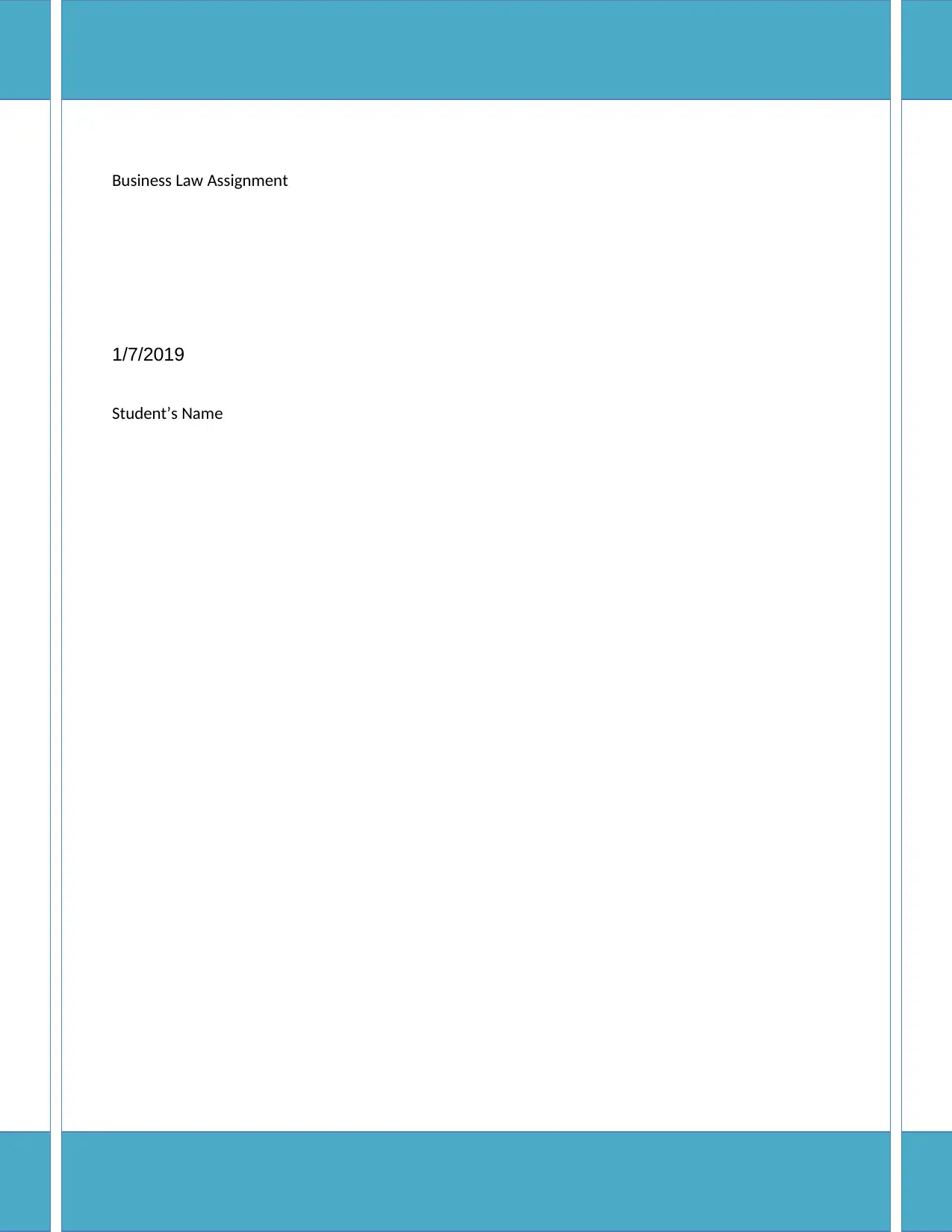
Running Head: BUSINESS AND CORPORATION LAW 0
Business Law Assignment
1/7/2019
Student’s Name
Business Law Assignment
1/7/2019
Student’s Name
Paraphrase This Document
Need a fresh take? Get an instant paraphrase of this document with our AI Paraphraser
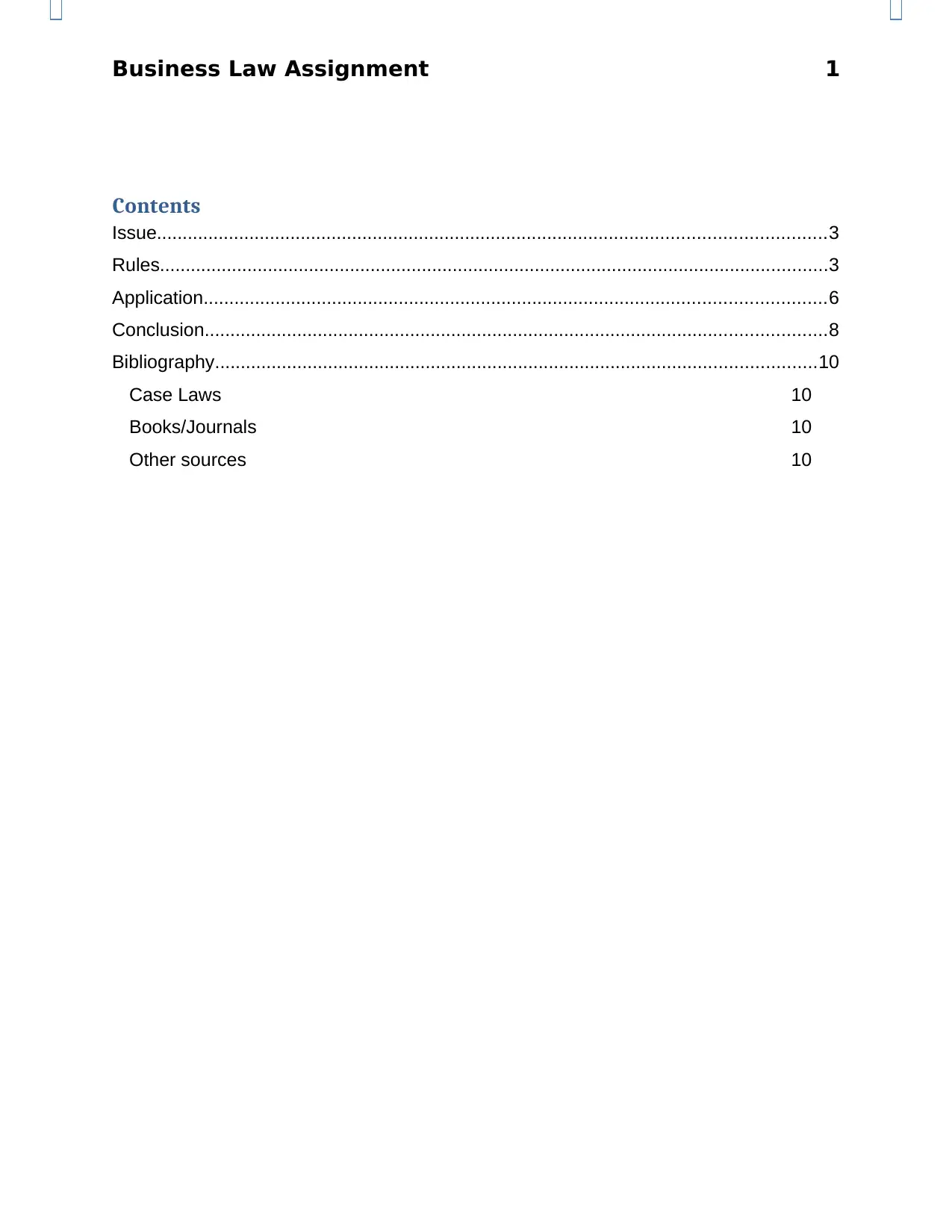
Business Law Assignment 1
Contents
Issue..................................................................................................................................3
Rules..................................................................................................................................3
Application.........................................................................................................................6
Conclusion.........................................................................................................................8
Bibliography.....................................................................................................................10
Case Laws 10
Books/Journals 10
Other sources 10
Contents
Issue..................................................................................................................................3
Rules..................................................................................................................................3
Application.........................................................................................................................6
Conclusion.........................................................................................................................8
Bibliography.....................................................................................................................10
Case Laws 10
Books/Journals 10
Other sources 10
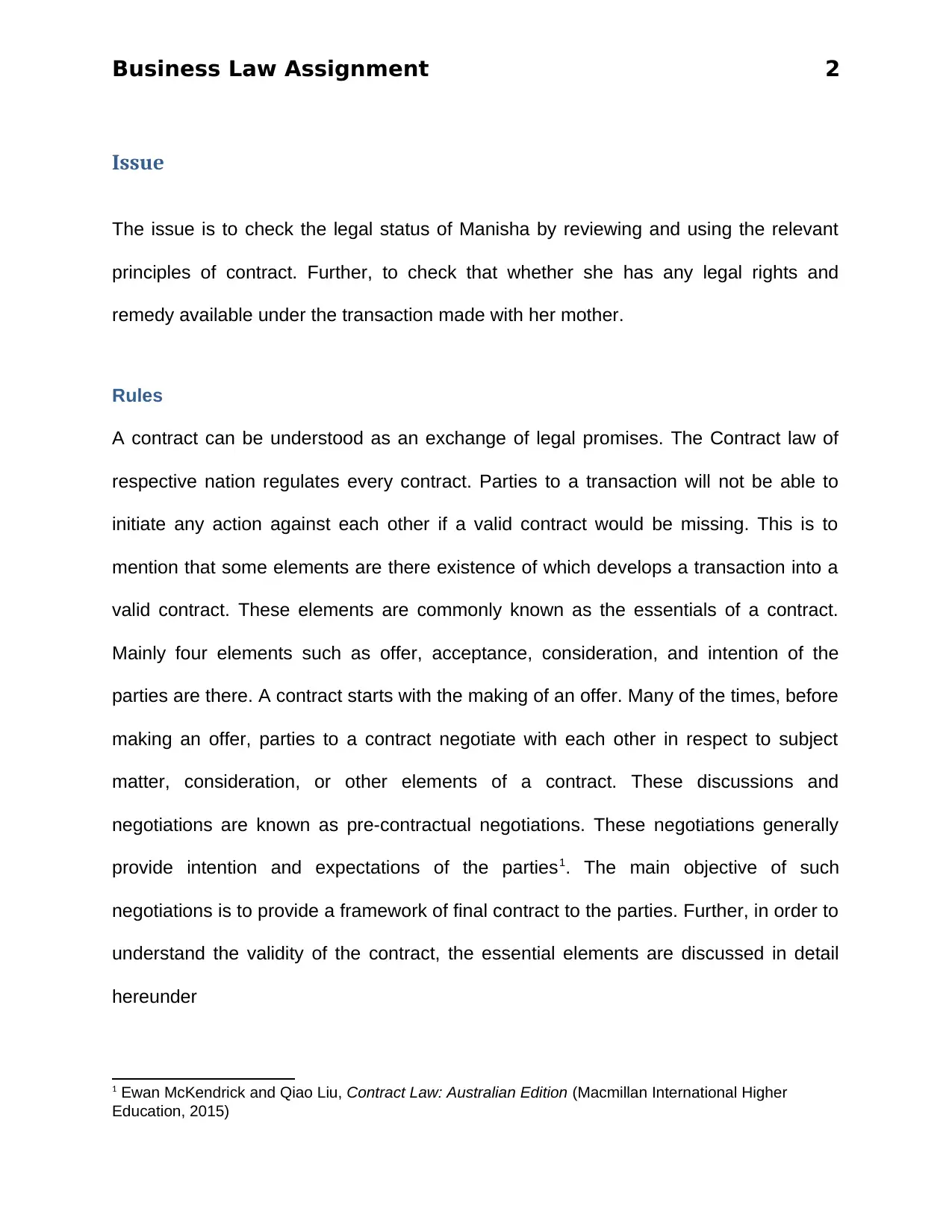
Business Law Assignment 2
Issue
The issue is to check the legal status of Manisha by reviewing and using the relevant
principles of contract. Further, to check that whether she has any legal rights and
remedy available under the transaction made with her mother.
Rules
A contract can be understood as an exchange of legal promises. The Contract law of
respective nation regulates every contract. Parties to a transaction will not be able to
initiate any action against each other if a valid contract would be missing. This is to
mention that some elements are there existence of which develops a transaction into a
valid contract. These elements are commonly known as the essentials of a contract.
Mainly four elements such as offer, acceptance, consideration, and intention of the
parties are there. A contract starts with the making of an offer. Many of the times, before
making an offer, parties to a contract negotiate with each other in respect to subject
matter, consideration, or other elements of a contract. These discussions and
negotiations are known as pre-contractual negotiations. These negotiations generally
provide intention and expectations of the parties1. The main objective of such
negotiations is to provide a framework of final contract to the parties. Further, in order to
understand the validity of the contract, the essential elements are discussed in detail
hereunder
1 Ewan McKendrick and Qiao Liu, Contract Law: Australian Edition (Macmillan International Higher
Education, 2015)
Issue
The issue is to check the legal status of Manisha by reviewing and using the relevant
principles of contract. Further, to check that whether she has any legal rights and
remedy available under the transaction made with her mother.
Rules
A contract can be understood as an exchange of legal promises. The Contract law of
respective nation regulates every contract. Parties to a transaction will not be able to
initiate any action against each other if a valid contract would be missing. This is to
mention that some elements are there existence of which develops a transaction into a
valid contract. These elements are commonly known as the essentials of a contract.
Mainly four elements such as offer, acceptance, consideration, and intention of the
parties are there. A contract starts with the making of an offer. Many of the times, before
making an offer, parties to a contract negotiate with each other in respect to subject
matter, consideration, or other elements of a contract. These discussions and
negotiations are known as pre-contractual negotiations. These negotiations generally
provide intention and expectations of the parties1. The main objective of such
negotiations is to provide a framework of final contract to the parties. Further, in order to
understand the validity of the contract, the essential elements are discussed in detail
hereunder
1 Ewan McKendrick and Qiao Liu, Contract Law: Australian Edition (Macmillan International Higher
Education, 2015)
⊘ This is a preview!⊘
Do you want full access?
Subscribe today to unlock all pages.

Trusted by 1+ million students worldwide
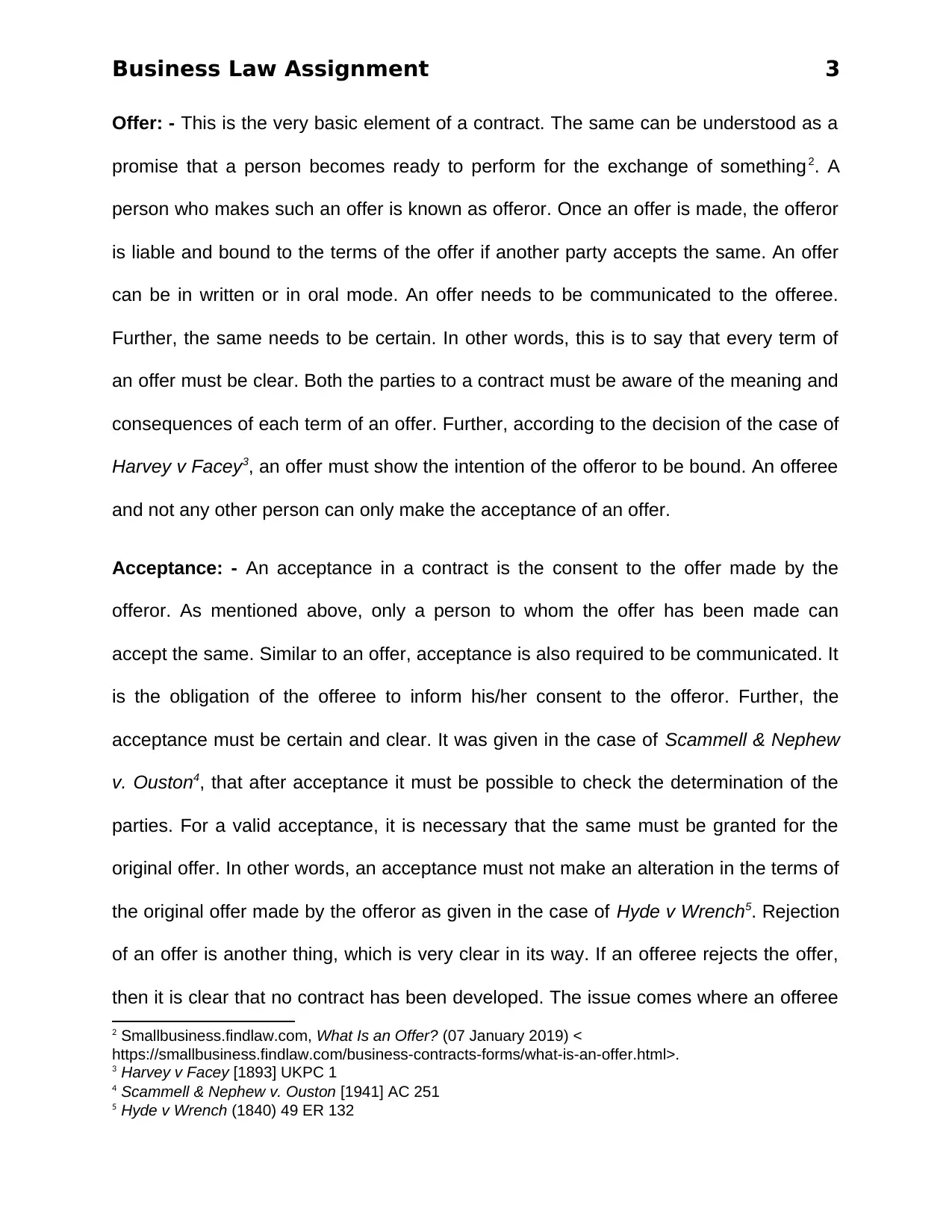
Business Law Assignment 3
Offer: - This is the very basic element of a contract. The same can be understood as a
promise that a person becomes ready to perform for the exchange of something 2. A
person who makes such an offer is known as offeror. Once an offer is made, the offeror
is liable and bound to the terms of the offer if another party accepts the same. An offer
can be in written or in oral mode. An offer needs to be communicated to the offeree.
Further, the same needs to be certain. In other words, this is to say that every term of
an offer must be clear. Both the parties to a contract must be aware of the meaning and
consequences of each term of an offer. Further, according to the decision of the case of
Harvey v Facey3, an offer must show the intention of the offeror to be bound. An offeree
and not any other person can only make the acceptance of an offer.
Acceptance: - An acceptance in a contract is the consent to the offer made by the
offeror. As mentioned above, only a person to whom the offer has been made can
accept the same. Similar to an offer, acceptance is also required to be communicated. It
is the obligation of the offeree to inform his/her consent to the offeror. Further, the
acceptance must be certain and clear. It was given in the case of Scammell & Nephew
v. Ouston4, that after acceptance it must be possible to check the determination of the
parties. For a valid acceptance, it is necessary that the same must be granted for the
original offer. In other words, an acceptance must not make an alteration in the terms of
the original offer made by the offeror as given in the case of Hyde v Wrench5. Rejection
of an offer is another thing, which is very clear in its way. If an offeree rejects the offer,
then it is clear that no contract has been developed. The issue comes where an offeree
2 Smallbusiness.findlaw.com, What Is an Offer? (07 January 2019) <
https://smallbusiness.findlaw.com/business-contracts-forms/what-is-an-offer.html>.
3 Harvey v Facey [1893] UKPC 1
4 Scammell & Nephew v. Ouston [1941] AC 251
5 Hyde v Wrench (1840) 49 ER 132
Offer: - This is the very basic element of a contract. The same can be understood as a
promise that a person becomes ready to perform for the exchange of something 2. A
person who makes such an offer is known as offeror. Once an offer is made, the offeror
is liable and bound to the terms of the offer if another party accepts the same. An offer
can be in written or in oral mode. An offer needs to be communicated to the offeree.
Further, the same needs to be certain. In other words, this is to say that every term of
an offer must be clear. Both the parties to a contract must be aware of the meaning and
consequences of each term of an offer. Further, according to the decision of the case of
Harvey v Facey3, an offer must show the intention of the offeror to be bound. An offeree
and not any other person can only make the acceptance of an offer.
Acceptance: - An acceptance in a contract is the consent to the offer made by the
offeror. As mentioned above, only a person to whom the offer has been made can
accept the same. Similar to an offer, acceptance is also required to be communicated. It
is the obligation of the offeree to inform his/her consent to the offeror. Further, the
acceptance must be certain and clear. It was given in the case of Scammell & Nephew
v. Ouston4, that after acceptance it must be possible to check the determination of the
parties. For a valid acceptance, it is necessary that the same must be granted for the
original offer. In other words, an acceptance must not make an alteration in the terms of
the original offer made by the offeror as given in the case of Hyde v Wrench5. Rejection
of an offer is another thing, which is very clear in its way. If an offeree rejects the offer,
then it is clear that no contract has been developed. The issue comes where an offeree
2 Smallbusiness.findlaw.com, What Is an Offer? (07 January 2019) <
https://smallbusiness.findlaw.com/business-contracts-forms/what-is-an-offer.html>.
3 Harvey v Facey [1893] UKPC 1
4 Scammell & Nephew v. Ouston [1941] AC 251
5 Hyde v Wrench (1840) 49 ER 132
Paraphrase This Document
Need a fresh take? Get an instant paraphrase of this document with our AI Paraphraser
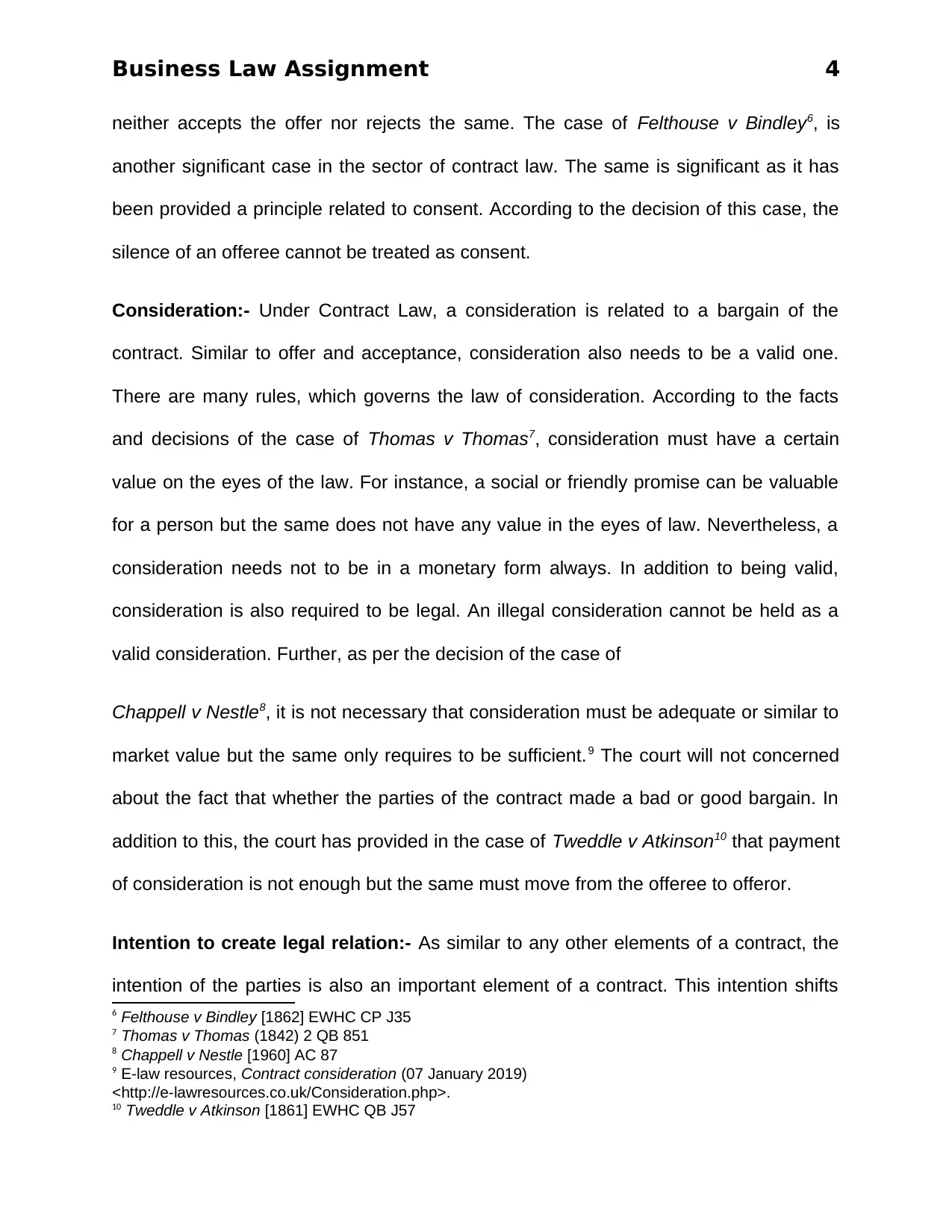
Business Law Assignment 4
neither accepts the offer nor rejects the same. The case of Felthouse v Bindley6, is
another significant case in the sector of contract law. The same is significant as it has
been provided a principle related to consent. According to the decision of this case, the
silence of an offeree cannot be treated as consent.
Consideration:- Under Contract Law, a consideration is related to a bargain of the
contract. Similar to offer and acceptance, consideration also needs to be a valid one.
There are many rules, which governs the law of consideration. According to the facts
and decisions of the case of Thomas v Thomas7, consideration must have a certain
value on the eyes of the law. For instance, a social or friendly promise can be valuable
for a person but the same does not have any value in the eyes of law. Nevertheless, a
consideration needs not to be in a monetary form always. In addition to being valid,
consideration is also required to be legal. An illegal consideration cannot be held as a
valid consideration. Further, as per the decision of the case of
Chappell v Nestle8, it is not necessary that consideration must be adequate or similar to
market value but the same only requires to be sufficient.9 The court will not concerned
about the fact that whether the parties of the contract made a bad or good bargain. In
addition to this, the court has provided in the case of Tweddle v Atkinson10 that payment
of consideration is not enough but the same must move from the offeree to offeror.
Intention to create legal relation:- As similar to any other elements of a contract, the
intention of the parties is also an important element of a contract. This intention shifts
6 Felthouse v Bindley [1862] EWHC CP J35
7 Thomas v Thomas (1842) 2 QB 851
8 Chappell v Nestle [1960] AC 87
9 E-law resources, Contract consideration (07 January 2019)
<http://e-lawresources.co.uk/Consideration.php>.
10 Tweddle v Atkinson [1861] EWHC QB J57
neither accepts the offer nor rejects the same. The case of Felthouse v Bindley6, is
another significant case in the sector of contract law. The same is significant as it has
been provided a principle related to consent. According to the decision of this case, the
silence of an offeree cannot be treated as consent.
Consideration:- Under Contract Law, a consideration is related to a bargain of the
contract. Similar to offer and acceptance, consideration also needs to be a valid one.
There are many rules, which governs the law of consideration. According to the facts
and decisions of the case of Thomas v Thomas7, consideration must have a certain
value on the eyes of the law. For instance, a social or friendly promise can be valuable
for a person but the same does not have any value in the eyes of law. Nevertheless, a
consideration needs not to be in a monetary form always. In addition to being valid,
consideration is also required to be legal. An illegal consideration cannot be held as a
valid consideration. Further, as per the decision of the case of
Chappell v Nestle8, it is not necessary that consideration must be adequate or similar to
market value but the same only requires to be sufficient.9 The court will not concerned
about the fact that whether the parties of the contract made a bad or good bargain. In
addition to this, the court has provided in the case of Tweddle v Atkinson10 that payment
of consideration is not enough but the same must move from the offeree to offeror.
Intention to create legal relation:- As similar to any other elements of a contract, the
intention of the parties is also an important element of a contract. This intention shifts
6 Felthouse v Bindley [1862] EWHC CP J35
7 Thomas v Thomas (1842) 2 QB 851
8 Chappell v Nestle [1960] AC 87
9 E-law resources, Contract consideration (07 January 2019)
<http://e-lawresources.co.uk/Consideration.php>.
10 Tweddle v Atkinson [1861] EWHC QB J57
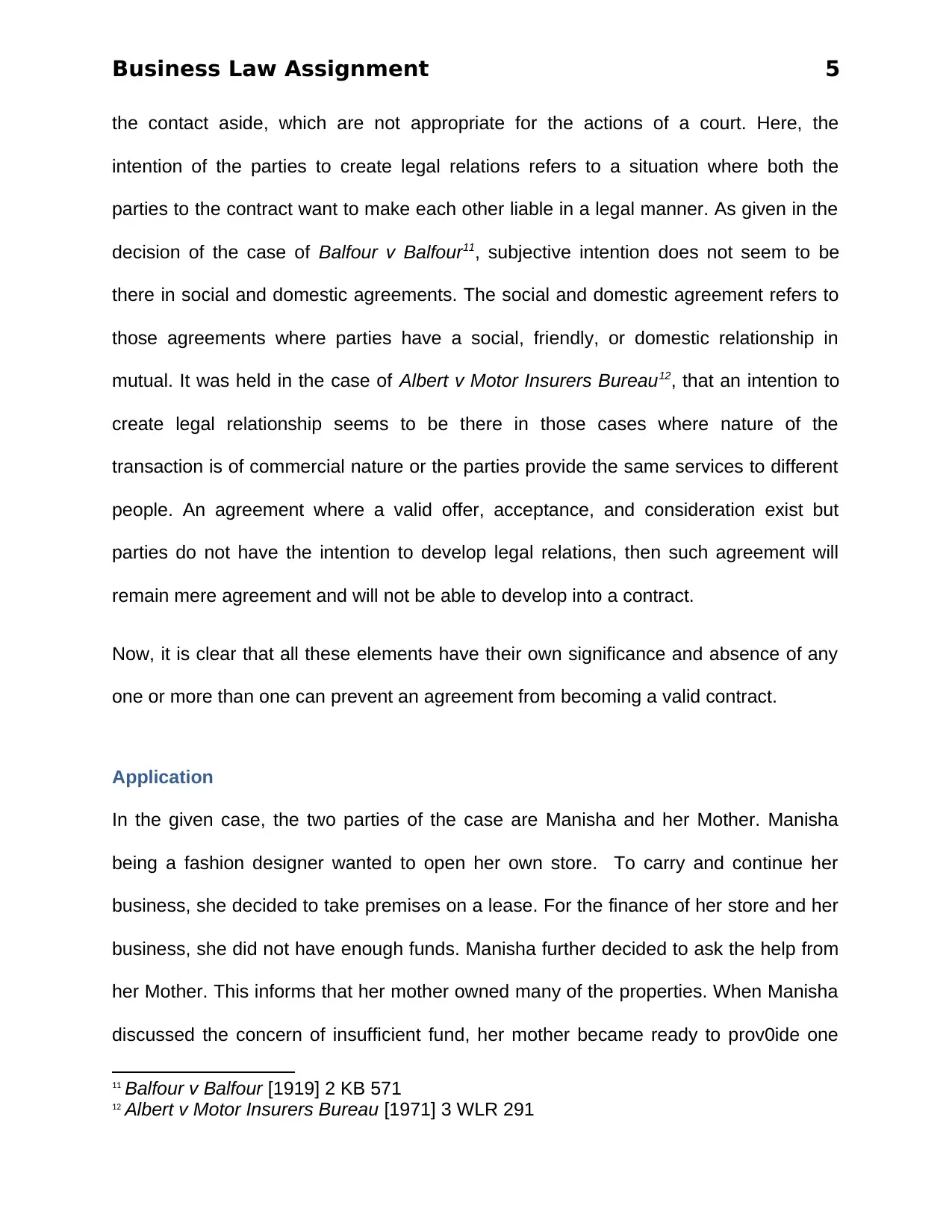
Business Law Assignment 5
the contact aside, which are not appropriate for the actions of a court. Here, the
intention of the parties to create legal relations refers to a situation where both the
parties to the contract want to make each other liable in a legal manner. As given in the
decision of the case of Balfour v Balfour11, subjective intention does not seem to be
there in social and domestic agreements. The social and domestic agreement refers to
those agreements where parties have a social, friendly, or domestic relationship in
mutual. It was held in the case of Albert v Motor Insurers Bureau12, that an intention to
create legal relationship seems to be there in those cases where nature of the
transaction is of commercial nature or the parties provide the same services to different
people. An agreement where a valid offer, acceptance, and consideration exist but
parties do not have the intention to develop legal relations, then such agreement will
remain mere agreement and will not be able to develop into a contract.
Now, it is clear that all these elements have their own significance and absence of any
one or more than one can prevent an agreement from becoming a valid contract.
Application
In the given case, the two parties of the case are Manisha and her Mother. Manisha
being a fashion designer wanted to open her own store. To carry and continue her
business, she decided to take premises on a lease. For the finance of her store and her
business, she did not have enough funds. Manisha further decided to ask the help from
her Mother. This informs that her mother owned many of the properties. When Manisha
discussed the concern of insufficient fund, her mother became ready to prov0ide one
11 Balfour v Balfour [1919] 2 KB 571
12 Albert v Motor Insurers Bureau [1971] 3 WLR 291
the contact aside, which are not appropriate for the actions of a court. Here, the
intention of the parties to create legal relations refers to a situation where both the
parties to the contract want to make each other liable in a legal manner. As given in the
decision of the case of Balfour v Balfour11, subjective intention does not seem to be
there in social and domestic agreements. The social and domestic agreement refers to
those agreements where parties have a social, friendly, or domestic relationship in
mutual. It was held in the case of Albert v Motor Insurers Bureau12, that an intention to
create legal relationship seems to be there in those cases where nature of the
transaction is of commercial nature or the parties provide the same services to different
people. An agreement where a valid offer, acceptance, and consideration exist but
parties do not have the intention to develop legal relations, then such agreement will
remain mere agreement and will not be able to develop into a contract.
Now, it is clear that all these elements have their own significance and absence of any
one or more than one can prevent an agreement from becoming a valid contract.
Application
In the given case, the two parties of the case are Manisha and her Mother. Manisha
being a fashion designer wanted to open her own store. To carry and continue her
business, she decided to take premises on a lease. For the finance of her store and her
business, she did not have enough funds. Manisha further decided to ask the help from
her Mother. This informs that her mother owned many of the properties. When Manisha
discussed the concern of insufficient fund, her mother became ready to prov0ide one
11 Balfour v Balfour [1919] 2 KB 571
12 Albert v Motor Insurers Bureau [1971] 3 WLR 291
⊘ This is a preview!⊘
Do you want full access?
Subscribe today to unlock all pages.

Trusted by 1+ million students worldwide
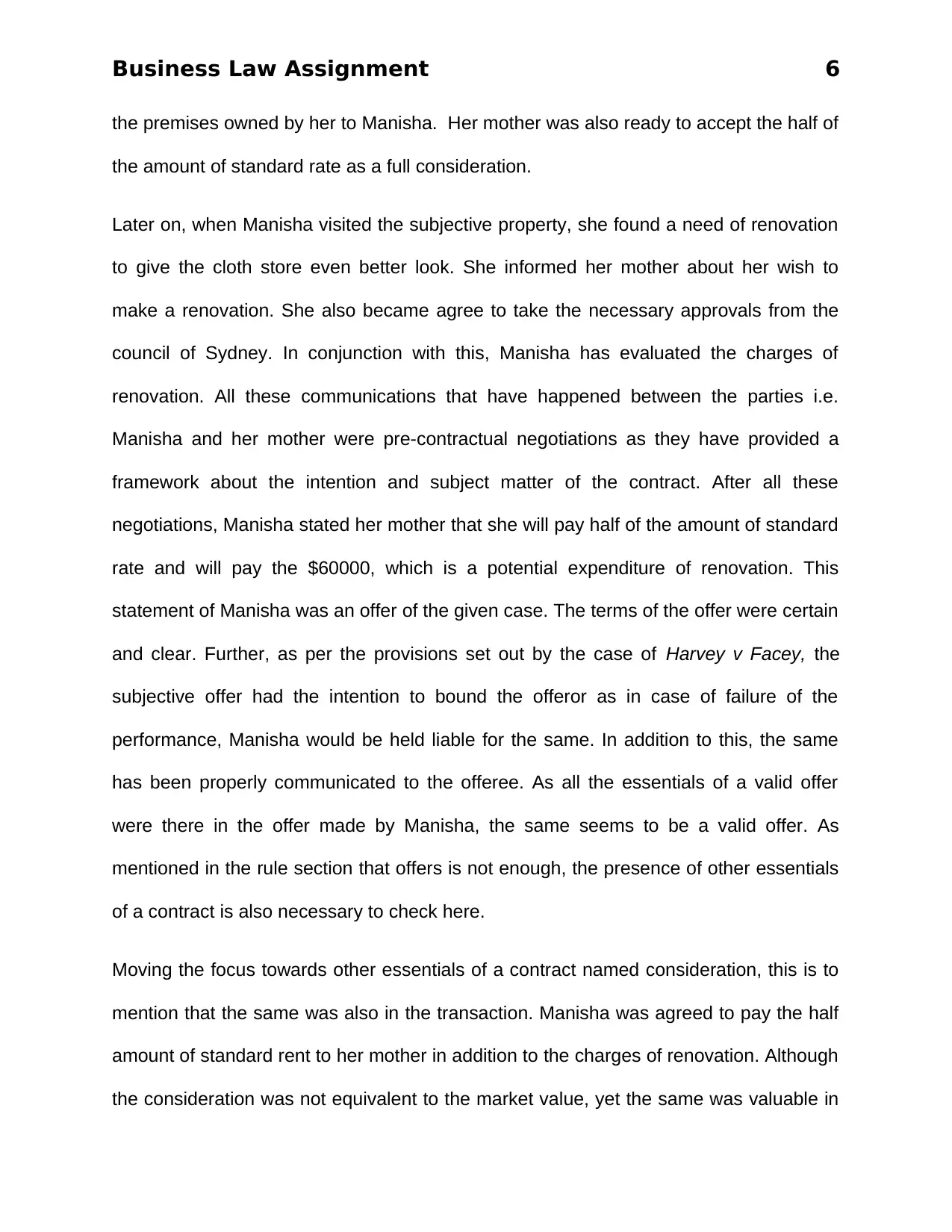
Business Law Assignment 6
the premises owned by her to Manisha. Her mother was also ready to accept the half of
the amount of standard rate as a full consideration.
Later on, when Manisha visited the subjective property, she found a need of renovation
to give the cloth store even better look. She informed her mother about her wish to
make a renovation. She also became agree to take the necessary approvals from the
council of Sydney. In conjunction with this, Manisha has evaluated the charges of
renovation. All these communications that have happened between the parties i.e.
Manisha and her mother were pre-contractual negotiations as they have provided a
framework about the intention and subject matter of the contract. After all these
negotiations, Manisha stated her mother that she will pay half of the amount of standard
rate and will pay the $60000, which is a potential expenditure of renovation. This
statement of Manisha was an offer of the given case. The terms of the offer were certain
and clear. Further, as per the provisions set out by the case of Harvey v Facey, the
subjective offer had the intention to bound the offeror as in case of failure of the
performance, Manisha would be held liable for the same. In addition to this, the same
has been properly communicated to the offeree. As all the essentials of a valid offer
were there in the offer made by Manisha, the same seems to be a valid offer. As
mentioned in the rule section that offers is not enough, the presence of other essentials
of a contract is also necessary to check here.
Moving the focus towards other essentials of a contract named consideration, this is to
mention that the same was also in the transaction. Manisha was agreed to pay the half
amount of standard rent to her mother in addition to the charges of renovation. Although
the consideration was not equivalent to the market value, yet the same was valuable in
the premises owned by her to Manisha. Her mother was also ready to accept the half of
the amount of standard rate as a full consideration.
Later on, when Manisha visited the subjective property, she found a need of renovation
to give the cloth store even better look. She informed her mother about her wish to
make a renovation. She also became agree to take the necessary approvals from the
council of Sydney. In conjunction with this, Manisha has evaluated the charges of
renovation. All these communications that have happened between the parties i.e.
Manisha and her mother were pre-contractual negotiations as they have provided a
framework about the intention and subject matter of the contract. After all these
negotiations, Manisha stated her mother that she will pay half of the amount of standard
rate and will pay the $60000, which is a potential expenditure of renovation. This
statement of Manisha was an offer of the given case. The terms of the offer were certain
and clear. Further, as per the provisions set out by the case of Harvey v Facey, the
subjective offer had the intention to bound the offeror as in case of failure of the
performance, Manisha would be held liable for the same. In addition to this, the same
has been properly communicated to the offeree. As all the essentials of a valid offer
were there in the offer made by Manisha, the same seems to be a valid offer. As
mentioned in the rule section that offers is not enough, the presence of other essentials
of a contract is also necessary to check here.
Moving the focus towards other essentials of a contract named consideration, this is to
mention that the same was also in the transaction. Manisha was agreed to pay the half
amount of standard rent to her mother in addition to the charges of renovation. Although
the consideration was not equivalent to the market value, yet the same was valuable in
Paraphrase This Document
Need a fresh take? Get an instant paraphrase of this document with our AI Paraphraser
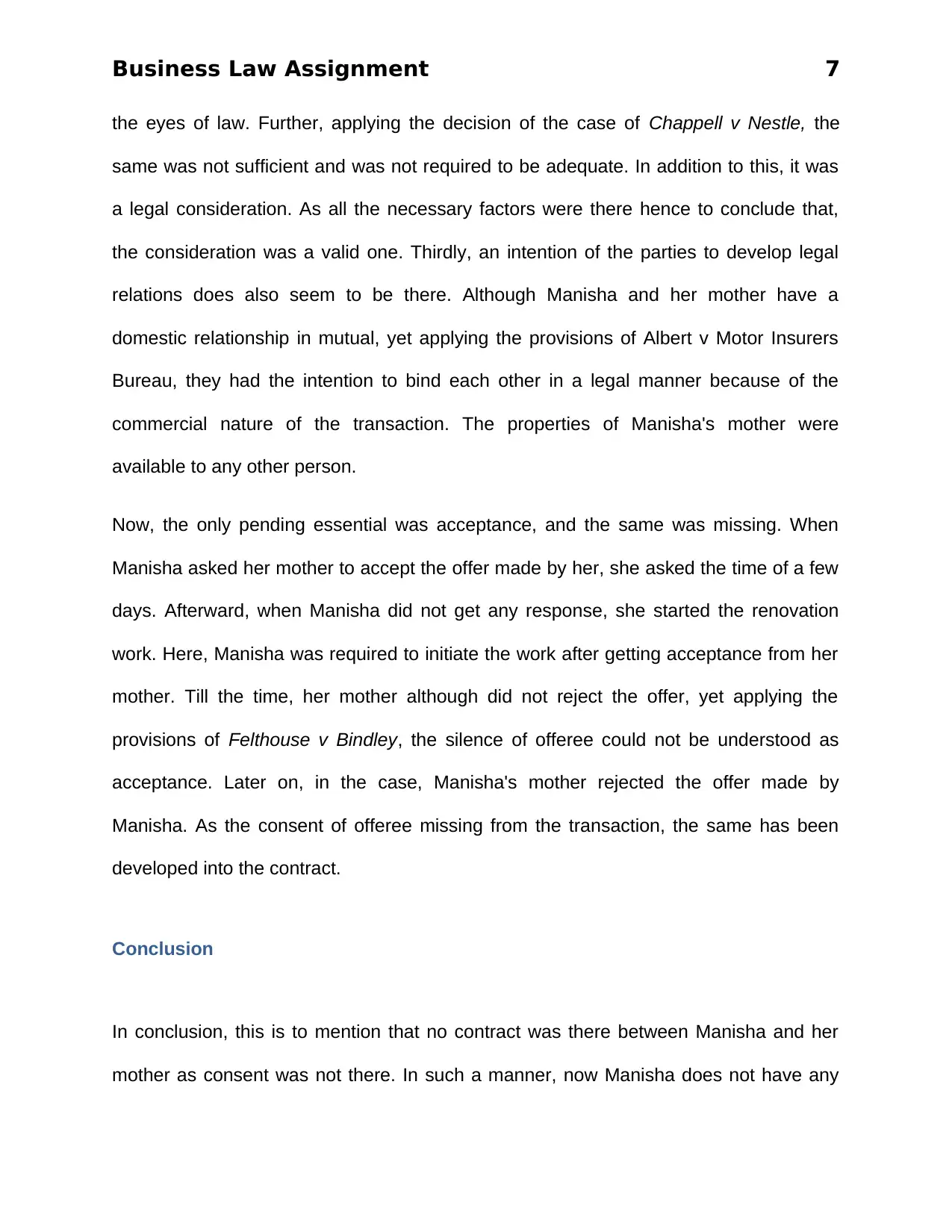
Business Law Assignment 7
the eyes of law. Further, applying the decision of the case of Chappell v Nestle, the
same was not sufficient and was not required to be adequate. In addition to this, it was
a legal consideration. As all the necessary factors were there hence to conclude that,
the consideration was a valid one. Thirdly, an intention of the parties to develop legal
relations does also seem to be there. Although Manisha and her mother have a
domestic relationship in mutual, yet applying the provisions of Albert v Motor Insurers
Bureau, they had the intention to bind each other in a legal manner because of the
commercial nature of the transaction. The properties of Manisha's mother were
available to any other person.
Now, the only pending essential was acceptance, and the same was missing. When
Manisha asked her mother to accept the offer made by her, she asked the time of a few
days. Afterward, when Manisha did not get any response, she started the renovation
work. Here, Manisha was required to initiate the work after getting acceptance from her
mother. Till the time, her mother although did not reject the offer, yet applying the
provisions of Felthouse v Bindley, the silence of offeree could not be understood as
acceptance. Later on, in the case, Manisha's mother rejected the offer made by
Manisha. As the consent of offeree missing from the transaction, the same has been
developed into the contract.
Conclusion
In conclusion, this is to mention that no contract was there between Manisha and her
mother as consent was not there. In such a manner, now Manisha does not have any
the eyes of law. Further, applying the decision of the case of Chappell v Nestle, the
same was not sufficient and was not required to be adequate. In addition to this, it was
a legal consideration. As all the necessary factors were there hence to conclude that,
the consideration was a valid one. Thirdly, an intention of the parties to develop legal
relations does also seem to be there. Although Manisha and her mother have a
domestic relationship in mutual, yet applying the provisions of Albert v Motor Insurers
Bureau, they had the intention to bind each other in a legal manner because of the
commercial nature of the transaction. The properties of Manisha's mother were
available to any other person.
Now, the only pending essential was acceptance, and the same was missing. When
Manisha asked her mother to accept the offer made by her, she asked the time of a few
days. Afterward, when Manisha did not get any response, she started the renovation
work. Here, Manisha was required to initiate the work after getting acceptance from her
mother. Till the time, her mother although did not reject the offer, yet applying the
provisions of Felthouse v Bindley, the silence of offeree could not be understood as
acceptance. Later on, in the case, Manisha's mother rejected the offer made by
Manisha. As the consent of offeree missing from the transaction, the same has been
developed into the contract.
Conclusion
In conclusion, this is to mention that no contract was there between Manisha and her
mother as consent was not there. In such a manner, now Manisha does not have any

Business Law Assignment 8
legal right in against of her mother. She can neither force her mother to provide the
premises on lease nor she can ask for any type of damages.
legal right in against of her mother. She can neither force her mother to provide the
premises on lease nor she can ask for any type of damages.
⊘ This is a preview!⊘
Do you want full access?
Subscribe today to unlock all pages.

Trusted by 1+ million students worldwide
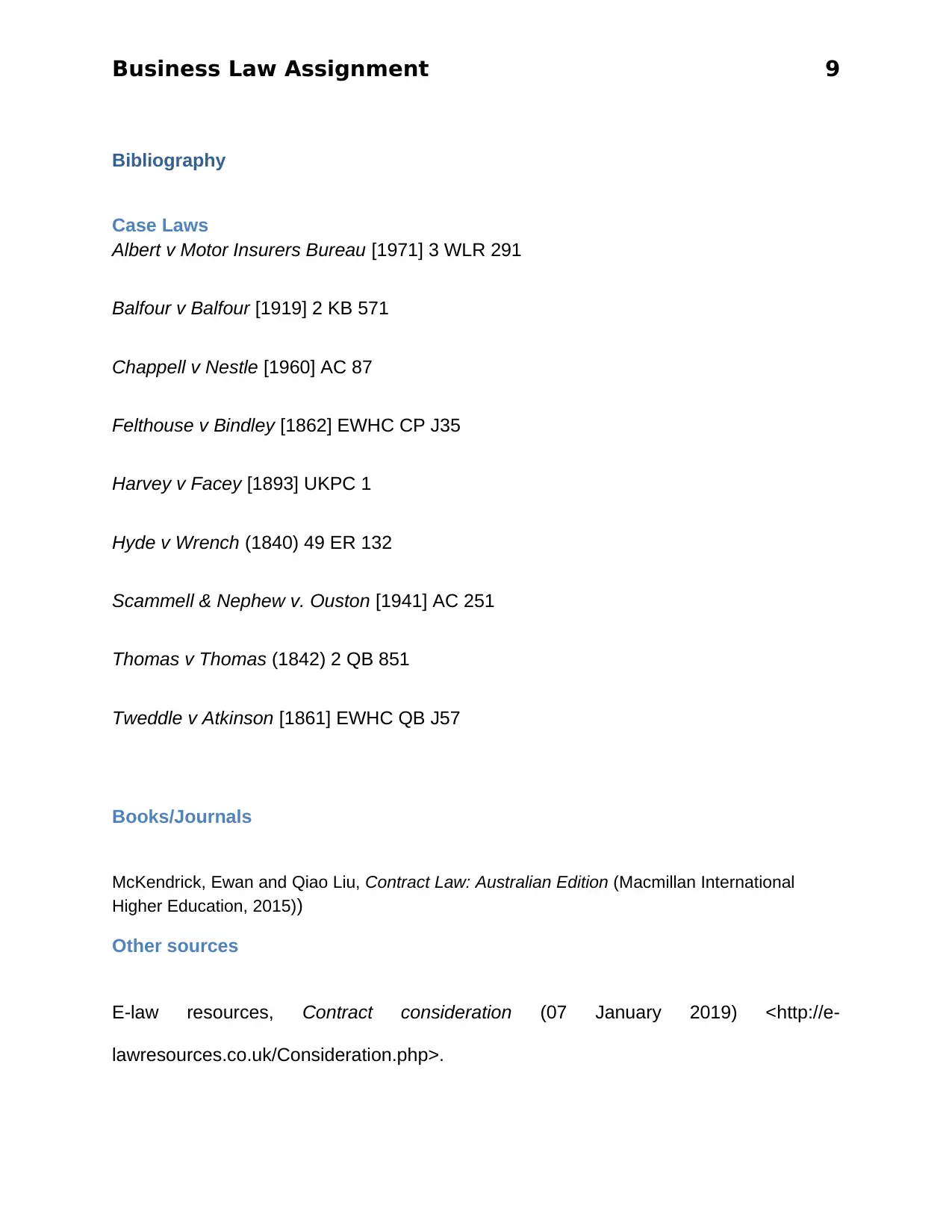
Business Law Assignment 9
Bibliography
Case Laws
Albert v Motor Insurers Bureau [1971] 3 WLR 291
Balfour v Balfour [1919] 2 KB 571
Chappell v Nestle [1960] AC 87
Felthouse v Bindley [1862] EWHC CP J35
Harvey v Facey [1893] UKPC 1
Hyde v Wrench (1840) 49 ER 132
Scammell & Nephew v. Ouston [1941] AC 251
Thomas v Thomas (1842) 2 QB 851
Tweddle v Atkinson [1861] EWHC QB J57
Books/Journals
McKendrick, Ewan and Qiao Liu, Contract Law: Australian Edition (Macmillan International
Higher Education, 2015))
Other sources
E-law resources, Contract consideration (07 January 2019) <http://e-
lawresources.co.uk/Consideration.php>.
Bibliography
Case Laws
Albert v Motor Insurers Bureau [1971] 3 WLR 291
Balfour v Balfour [1919] 2 KB 571
Chappell v Nestle [1960] AC 87
Felthouse v Bindley [1862] EWHC CP J35
Harvey v Facey [1893] UKPC 1
Hyde v Wrench (1840) 49 ER 132
Scammell & Nephew v. Ouston [1941] AC 251
Thomas v Thomas (1842) 2 QB 851
Tweddle v Atkinson [1861] EWHC QB J57
Books/Journals
McKendrick, Ewan and Qiao Liu, Contract Law: Australian Edition (Macmillan International
Higher Education, 2015))
Other sources
E-law resources, Contract consideration (07 January 2019) <http://e-
lawresources.co.uk/Consideration.php>.
Paraphrase This Document
Need a fresh take? Get an instant paraphrase of this document with our AI Paraphraser

Business Law Assignment 10
Smallbusiness.findlaw.com, What Is an Offer? (07 January 2019) <
https://smallbusiness.findlaw.com/business-contracts-forms/what-is-an-offer.html>.
Smallbusiness.findlaw.com, What Is an Offer? (07 January 2019) <
https://smallbusiness.findlaw.com/business-contracts-forms/what-is-an-offer.html>.
1 out of 11
Related Documents
Your All-in-One AI-Powered Toolkit for Academic Success.
+13062052269
info@desklib.com
Available 24*7 on WhatsApp / Email
![[object Object]](/_next/static/media/star-bottom.7253800d.svg)
Unlock your academic potential
Copyright © 2020–2025 A2Z Services. All Rights Reserved. Developed and managed by ZUCOL.



